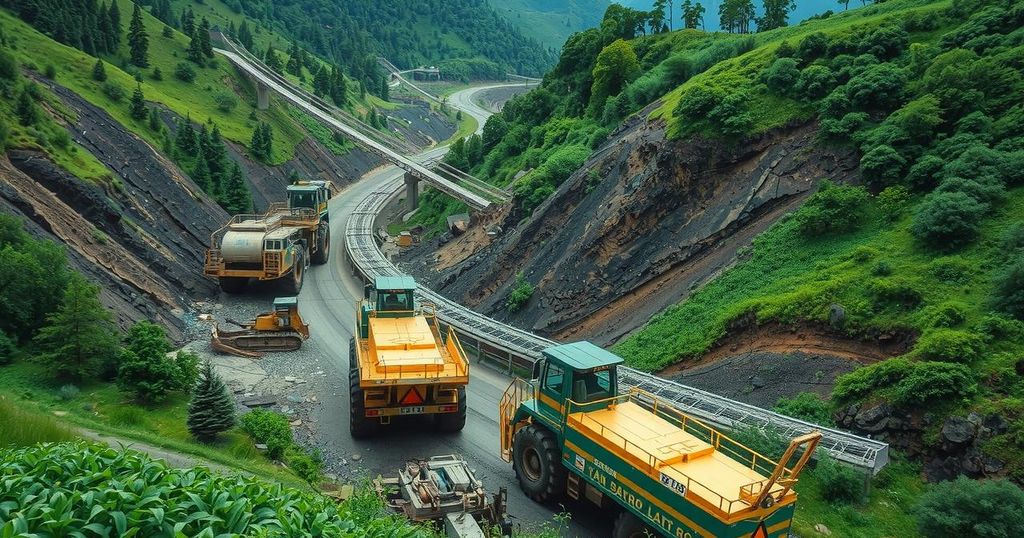The Democratic Republic of Congo is beleaguered by decades of illegal mining operations, primarily run by Chinese nationals. These operations contribute to significant local suffering and environmental degradation. Recent arrests of Chinese nationals for illegal mining highlight vulnerabilities within governance. As the Lobito Corridor project looms, questions arise regarding its potential impact on ethical extraction and local welfare amid ongoing strife and exploitation.
Since the colonial period, the Democratic Republic of Congo (DRC) has faced exploitation that’s gone beyond just resource extraction; it’s deep-rooted in various atrocities against its people. The turmoil has persisted for over three decades, primarily fueled by illegal mining operations. These operations involve both foreign and local armed groups, thus exacerbating the challenges faced by vulnerable local communities. It’s striking that, despite the tech industry’s reliance on DRC’s minerals for a green energy future, the ongoing transparency issues in the mineral supply chain have largely gone unnoticed by much of the world. With a death toll surpassing 10 million, the conflicts in this region stand as the deadliest since World War II.
In South Kivu Province alone, over 450 mining companies exist, with a significant presence of Chinese operators. Alarmingly, many of these companies are deemed illegal as they do not adhere to Congolese mining regulations. Recent events have put a spotlight on illegal activities and governance failures within the DRC, particularly as fighting continues in the eastern regions of the country. For instance, in late December 2024, 17 Chinese nationals were arrested for illegal gold mining but were released shortly after, raising questions about accountability and the implications of government interference.
On January 4, 2025, three more Chinese nationals were detained with a cache that included gold bars and substantial cash, which points to a larger scheme possibly implicating various actors in money laundering processes. This situation unfolds while basic social services for local communities remain heavily neglected. Contracts between Chinese and Congolese entities over mineral extraction in return for infrastructure investments paint a grim picture of governance in the DRC.
The illegal operations have further led to violence in the region, particularly with M23 rebels seizing resource-rich towns. The ongoing war intensifies as key areas hold deposits of valuable minerals. Reports indicate that severe malnutrition among children under five is alarmingly high near these mining operations, with many children not attending school and local ecosystems degraded. The region is witnessing not just human suffering but environmental damage as well.
In a rather striking revelation, South Kivu Province’s newly-elected Governor, Professor Jean-Jacques Purusi, identified the scale of illegal Chinese mining right after taking office. The alarming conditions include rampant corruption, a lack of permits among mining firms, and collusion with armed groups. Although there have been attempts to improve governance in the extraction sector, scrutiny remains on how effective these initiatives will be without strong backing from the national government.
Looking ahead, the Lobito Corridor project, funded by the U.S. and the E.U. and visited by President Biden in December 2024, raises critical questions. Will this initiative promote ethical mining practices, create better jobs, and enhance cooperation for minerals? Furthermore, will it ensure community engagement and environmental protections? Concerns persist about whether genuine improvements can arise from past failures surrounding mineral exploitation.
The call for robust governance in the DRC is urgent to combat corruption and protect human rights. It is essential that end-users of technology sourced from Congolese minerals advocate for transparency and ethical practices within the supply chain. Ongoing human rights abuses and the brutality linked with mineral extraction must be addressed if there’s hope for peace and stability in the DRC—especially in the mineral-rich eastern regions.
The situation in the Democratic Republic of Congo illustrates a troubling intersection of illegal mining, human rights challenges, and governance failures. The significant presence of illegal Chinese-operated mining companies highlights issues of complicity and corruption, further entrenching local communities in poverty and malnutrition. The proposed Lobito Corridor project raises hope for potential reform, though skepticism about actual changes remains high. A call for transparency and accountability is essential to address the continuous exploitation linked to the DRC’s rich mineral deposits, crucial for a sustainable global tech future.
Original Source: www.hks.harvard.edu






